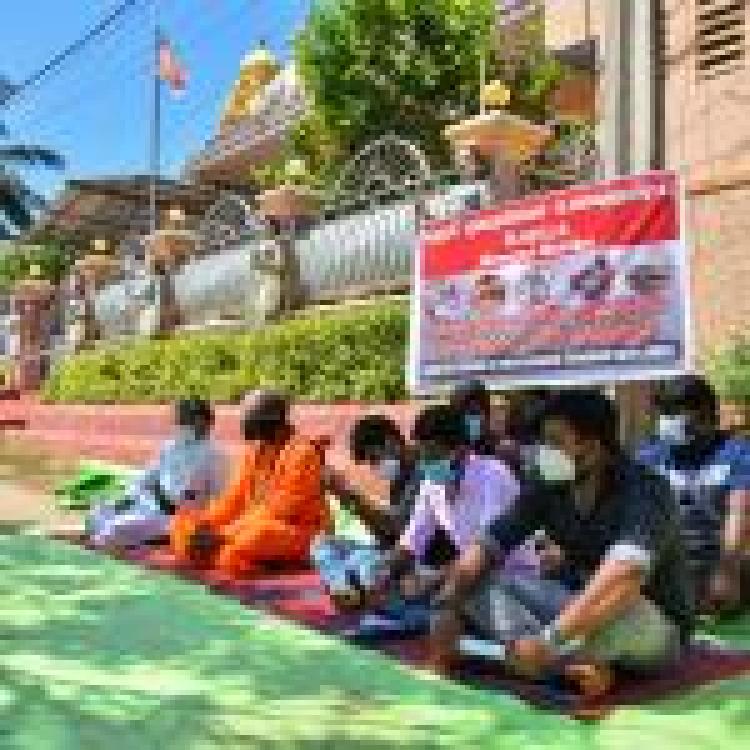![]()
Writing in Just Security, former Senior Lecturer in Law at University of Jaffna, Dr Kumaravadivel Guruparan, highlights the failure of the international community to hold Sri Lanka’s war criminals to accounts and calls for “an honest debate on the inherent limits of the human rights system in preventing ongoing violations and dealing with historical atrocities”.
Unwarranted Enthusiasm
In his article, Guruparan highlights the “unwarranted enthusiasm” of the international community towards the previous Sri Lanka administration which had agreed to co-sponsor the UN Human Rights Council’s resolution 30/1.
This enthusiasm he notes came despite consistent failures to meet the obligations of the resolution leading to rollbacks of said resolution in 2017 with resolution 34/1 and in 2019 with resolution 40/1. Whilst noting the “half-felt measures” made by the Sirisena administration, he notes their consistent failures which were drive by the fact that “irrespective of party affiliation, neither of the two main parties that represent the Sinhalese Buddhist majority have a domestic, internal, democratic incentive to implement a genuine agenda for accountability”.
The government belief of Sri Lanka’s Sinhala Buddhist majority is that “the war had to be won at any cost to protect Sri Lanka as a unified political system founded on values that provided for a centralized system of government and one which gave Buddhism the foremost place in the governance of the country”, Guruparan notes.
Reflecting on the previous administration, he notes that Sri Lanka’s former President, Maithripala Sirisena, consistently downplayed the resolution and even claimed that “he was not told about the decision to co-sponsor the resolution”.
Ranil Wickremesinghe, then Prime Minister, as well as then Foreign Minister, Mangala Samaraweera, instead had portrayed “it to the Sinhalese Buddhist majority as a foreign policy win for Sri Lanka and as a move that saved the country from further scrutiny and international action”.
This, Guruparan highlights, was not an attempt to engage with the UNHRC but rather “an example of better foreign policy management”.
On the part of the United States, the United Kingdom, and the European Union, Guruparan notes that there were geopolitical concerns which motivated their support for the previous administration, namely the decision to distance itself from China.
Ultimately, whilst this administration had enabled for an opening up of civil society space, it was “not matched with a dismantling of the state’s massive surveillance system, which remained in place and was deployed to track those who would mobilize and protest government action”. This Guruparan notes was of particular concern “for activists in the majority Tamil North and East provinces, threats and intimidation continued, albeit in lesser forms and methods”.
Dealing with Sri Lanka’s impunity
Highlighting the UN High Commissioner for Human Rights’ report which noted Sri Lanka’s “unwilling and unable” to deliver on accountability, Guruparan remarks that her predecessor, High Commissioner Prince Zeid Ra’ad Zeid Al Hussein, had already arrived at in September 2015. In Zeid’s statement, he noted a “total failure of domestic mechanisms.”
The proposed resolution, Guruparan notes, proposes an evidence-gathering mechanism, similar to the one dedicated to Syria and Myanmar, however, “without a clear plan of the judicial process to which such a mechanism would contribute, this would result in just another placeholder mechanism with no impact on the current government”.
He further calls for “coordination between the U.N.’s work in Sri Lanka, in Geneva –- home to the human rights bodies, and in New York, home to the Security Council”. Noting the disregard the UN for Sri Lanka had for the OHCHR, he sheds lights on the failure of different agencies in the UN which often work at cross purposes.
This is evident in the current attempts to work with the Rajapaksa regime to bring the country’s counterterrorism legislation in line with international human rights standards, “an issue in which the Sri Lankan government has no genuine interest whatsoever”.
This failure to unify behind a common strategy with regards to engagement with Sri Lanka gives rise to serious concern and demands to an “honest debate on the inherent limits of the human rights system”.




